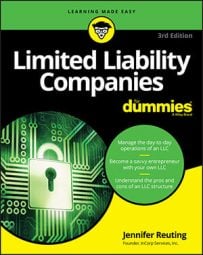The disregarded entity tax status is the default for single-member LLCs. Essentially, it’s the same tax status you’d pay as a sole-proprietorship (as if you haven’t filed your LLC at all). It’s the one form of tax status that LLCs with multiple members can’t elect.
Similar to partnership taxation, disregarded entity tax status is a form of pass-through taxation, and in this case the sole member pays personal income taxes and self-employment taxes on the company’s profits and/or losses on his personal tax return. The LLC is treated as a separate entity for the purpose of paying employment and excise taxes only.
Just because the IRS “disregards” your LLC for tax purposes doesn’t mean that the same liability protection doesn’t apply. It does. Assuming you have a solid operating agreement and practice good record keeping, you won’t be held personally responsible for the liabilities of your business.
Single-member LLCs aren’t allowed to elect partnership taxation; however, if you’re a single-member LLC and don’t want to be treated as a disregarded entity by the IRS, you may want to consider electing corporation or S corporation taxation.

